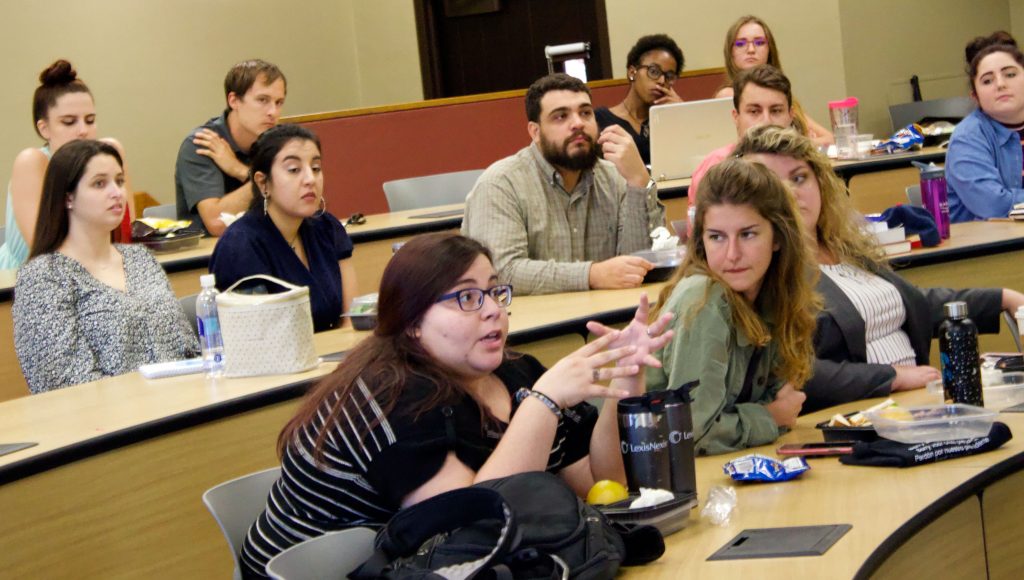Stetson students get a crack at criminal law reform in FL

By George Thurlow
State Sens. Darryl Rouson (D-St. Petersburg) and Jeff Brandes (R-St. Petersburg) spoke to Stetson College of Law students about the Florida Legislature’s Criminal Punishment Code Task Force during a campus visit on Sept. 24.
The Florida Legislature created the Task Force last spring to take a fine-toothed comb to the state’s Criminal Punishment code. The group is studying how to rethink non-criminal sanctions, sentencing enhancements, and sentencing guideline calculations.
As part of that effort, Sen. Rouson contacted Stetson Law Professor Judith Scully with a proposal to create a student-equivalent of the Task Force at Stetson. The goal is for the students to conduct extensive research of their own and to draft legislation to be presented at the Spring 2020 Session of the Florida Legislature, which runs from January to March 2020.
Matt Keen, a 3L at Stetson, will oversee the creation of the Law Student Criminal Punishment Code Task Force and its work as part of his directed research project for his Social Justice Advocacy concentration.
“The process, although only recently started, has already been incredibly rewarding,” Keen said. “I feel extremely grateful to both Professor Scully and to Stetson Law as a whole for preparing me to undertake this experience.”
State of criminal reform in Florida
Sen. Rouson, whose district includes the College of Law, explained that Florida’s current criminal justice system is based mainly on 1997 and 1998 revisions to the Criminal Punishment code that introduced things such as the elimination of discretionary sentencing by judges, mandatory minimum sentences for both non-violent and violent crimes, “three strikes” laws, and the requirement that inmates serve 85 percent of their sentences. The result of these changes is that, as Sen. Rouson put it, “rehabilitation [became] subordinate to punishment.”
Sen. Brandes explained that most prisons have 20-40 percent staff vacancy rates, and the statewide average two-year staff retention rate is 46 percent. The average pay of a corrections officer is less than $35,000 per year, and given that few auxiliary staff positions are filled, corrections officers are responsible for many things beyond their job responsibilities.
Prisons face more than just staffing challenges. Fewer than five percent of inmates have educational opportunities, resulting in little opportunity for rehabilitation and making prison violence and crime more common, Brandes said. Officer-inmate violence and inmate-inmate violence is up nearly 50 percent over the past 10 years, and there’s been nearly a 500 percent increase in contraband. Inmates who have completed their sentence receive little re-entry assistance (only $50 and a bus pass), so that, coupled with the lack of rehabilitation, leads to increased recidivism and penalties.

Sen. Brandes estimates the cost adequately staffing prisons and making them a rehabilitative atmosphere to be nearly $200 to $300 million a year. To make that realistic, he has a number of proposals to limit the prison population, including diversionary programs such as drug courts and veterans court, as well as facilitating earlier releases and re-entry programs.
Sens. Rouson and Brandes were optimistic about the prospects of achieving such reforms in the future, although they identified potential hurdles, including lack of support from law enforcement and the fact that prison reform is a hard issue to excite people about. The two said they are eager for the opportunity to work with students for fresh ideas and perspectives.
Students who are interested in helping with the Law Student Criminal Punishment Code Task Force should contact Matt Keen at [email protected] or speak with Professor Judith Scully.
Post date: Sept. 30, 2019
Media contact: Kate Bradshaw
[email protected] | 727-430-1580